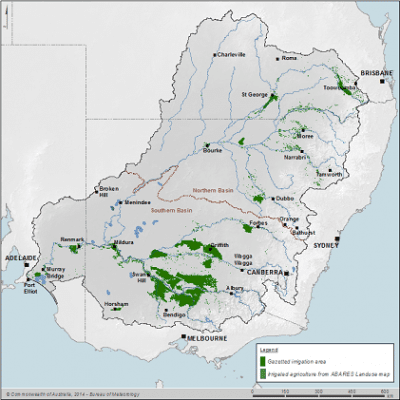THERE is sufficient capacity in the Murray Darling Basin (MDB) for 450 gigalitres (GL) of additional environmental water to be recovered from water efficiency projects “on a neutral or positive socio-economic basis”, according to a report into water efficiency measures released on Friday.
However, there are a number of constraints associated with recovering the 450GL, including budgetary requirements and the extent to which stakeholders will participate in the program, particularly in relation to on-farm projects.
Commissioned by the MDB Ministerial Council last year, the more than 300-page report by Ernst and Young follows four months of extensive community and stakeholder consultations across the Basin.
National Irrigators Council (NIC) CEO, Steve Whan, said the report on the 450GL component of the MDB Plan, which would bring the water recovery target up to the equivalent of 3200GL (around 10 per cent of the water that flows into basin rivers), provided food for thought.
“When the Basin Plan was announced, the then Labor Government promised that this component would come only if it were possible with improved or at least no negative impacts on communities,” he said.
Basin Ministers commissioned the report to examine how that might be able to be achieved.
Mr Whan said while the report left a lot of work to be done, it did highlight some important points.
“First it acknowledges that on farm programs can have negative flow on impacts on broader communities and it makes it clear that much more work needs to be done on the ground and with communities if they are to be a part of the process,” he said.
“NIC welcomes that, we don’t want to see communities and the viability of irrigation districts compromised by blunt poorly designed programs. It highlights the key flaw of the current impact test. It tests only the individual, with no assessment of flow on community impacts (a standard South Australia would not have accepted with closure of automotive manufacturing or shipbuilding).
“I note the very strong commentary throughout the report that there is a ‘lack of understanding and trust’. Building trust and understanding takes time and effort, it won’t be achieved by just applying a one size fits all program across the basin.”
Mr Whan said the second key point was the potential for off-farm projects to contribute to the target.
The report provides a number of possibilities including changes to other infrastructure, river management and even greater urban efficiency from the cities using Murray Darling water (including Canberra and Adelaide).
“Those proposals are worth pursuing – but they will clearly take time. There are very genuine and justified fears about impact on communities if this is handled badly. This report gives some strong direction on the amount of work that needs to be done, and a clear message to take our time and get it right,” he said.
Federal Minister for Agriculture and Water Resources, David Littleproud, said the report drew on other studies on the social and economic impacts of water efficiency measures, including the effects of off- and on-farm water infrastructure investment and water recovery programs.
“The Ernst and Young study clearly acknowledges governments need to work with communities, irrigators and industry sectors to ensure that efficiency measures have neutral or positive social and economic outcomes—this is critical to better understanding the impacts of water efficiency measures,” Minister Littleproud said.
“All Basin governments agreed to the plan, and I believe this report provides us with a pathway to delivering it. It identifies a range of off-farm and urban water efficiency measures which can safely deliver some water savings without negative social or economic impacts.
“I am keen to work with Basin states to begin implementing many of these efficiency measures within the next few months. We can lay out the pathway to do this when the Ministerial Council meets in April this year.
“I will not play politics with this. Political fighting creates uncertainty which affects the lives of real people.
“I’ve sat around farmers’ kitchen tables and seen the strain in their eyes caused by uncertainty. The tiredness caused by working long hours and not knowing what’s around the corner. What farmers, rural businesses and communities need most is certainty and to see that we are nearing the light at the end of the tunnel.”
Minister Littleproud said the report also acknowledged that more work needed to be done to better understand and monitor the impacts of water efficiency measures.
“The EY study gives us a reference point for a frank, respectful and constructive discussion on efficiency measures and to get cracking on savings which can be made now without social or economic impacts,” he said.
“We have all agreed to the Basin Plan. It is important we all act maturely and treat those communities most directly affected in the Basin Plan with the respect they deserve, the respect of certainty.
“I remain committed to delivering the plan to which all Basin governments agreed, the 450GL and delivering efficiency measures without negative social or economic impacts.”
The report will now go to the MDB Ministerial Council which will study its findings and make any agreed changes on how to implement efficiency measures.
Sources: MDBA, National Irrigators’ Council, Federal Minister for Agriculture.
…………………………………
The MDB extends across 1 million square kilometres over four states and one territory, with over 2.11 million people living in the Basin and using the water resource.
In 2014-15, the Basin produced $7 billion worth of irrigated agricultural output.
Read the full report: https://www.mdba.gov.au/sites/default/files/Analysis-of-Efficiency-Measures-Final-Report-v2.pdf
Grain Central: Get our free daily cropping news straight to your inbox – Click here






HAVE YOUR SAY